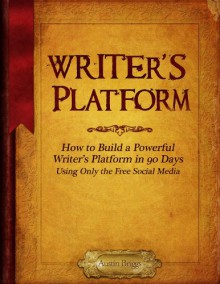
I got this book free from a giveaway.
The premise sounded interesting, although I can't say I much believed the title. Since I'm delving into writing, I figured I'd join and see if I could win it and if so, how it was. I did, and so here we are.
Please note: I have not actually tried the method yet, so I can't vouch for how good it works (or not), but I will review the book itself.
The book offers a general review of things that will help you build up to a book release (and how to live up to it, according to it). It's reasonable enough, with sound (if slightly obvious sometimes) advise, and it promises to be good for self-publishing as well as traditional publishing.
One thing that annoyed me was the self-quoting (little red squares of text quoting the thing that is either on that same page right next to the bos or on a page before/after). They were a little distracting because, in a ~190 pages book that has no walls of text, it was really not necessary.
Basically, the book treats your author name as a business brand, and I think it has a solid point in telling one to behave as if they were a professional business; after all, as a professional writer, that's what you'd be. They called this your "brand", a word I didn't much care for when it was first mentioned, but that made a lot more sense towards the end of the book.
Some sections have little exercises for you to do as you go along, which is kind of cute. It also has resources (read: several liniks) for helpful things: bookformatting, editors, examples and other such. However, I don't feel telling you "these sites do it great" is good content, when some things can be explained directly.
This also talks a lot about blogging, as it seems to be the basis of this social platform. I understand why it would be so and the need for it, however I've been reading lately that it might not be good for some writers (read: If you abandon your blog later, because even if you DO manage to go through with the 90-day proposed here, someday you're just bound to run out of ideas on what to blog about, particularly if your subject matter has a rather finite set of topics to cover).
Sometimes the book feels a little repetitive. Things that are explained are then either re-explained in slightly different wording or merely expanded upon.
I did find the pinterest tactics/suggestions (as brief as that section was) interesting. Some ideas are pretty out there ("Spend a month living as one of your characters (e.g., exploring the Amazon) and post the video documentary series", for instance), but not bad (if you're rich and can do that ;) ).
Although it promises to view a writers platform, it also provides a general overview on editing and other such advise. In fact, up to about ~130 pages in, it's all a general overview of things: of what the social platforms are, of what you should and shouldn't do, etc. After that you really go in-depth on a step-by-step of the program you are to follow.
It does look like a time-intensive program, the 90 days you decide to do it should be spent quite a bit on it. It's definitely not apt for the socially reclusive (of course, you're building a social platform, so you're not -supposed- to be reclusive, but if you have a hard time maintaining your regular social circles, then creating a social platform might not be for you... )
The best advise this book gives is "You’re building a successful platform. Behave as if you already have one."
Overall though, the information found here is nothing that can't be found all around the internet, but I suppose it's good to save yourself the googling and have it all in one place. It's a quick read, it doesn't hurt to give it a look even if you won't (or can't) go through with the calendar right away.
If you know nothing of how to build a writer's platform, this book might just be great for you.
If you have a basic idea already, then you may not find it as useful or as interesting, but you may still find some tips and examples to build on that spark your own creativity.

 Log in with Facebook
Log in with Facebook 





